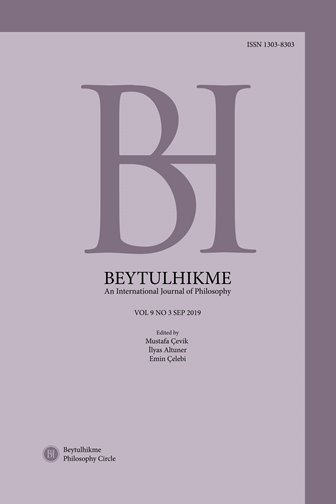Author :
Abstract
Dil ve Mantık arasındaki ilişkinin felsefi zeminine değinmek üzere bir çalışma yapmaktayız. Dil ve Mantık, sentez olmuş araçlar olarak “sentetik yollar” tamlamasıyla telaffuz edilmelidir çünkü “Mantık bilimi”, “zihin” yoluyla türetilmiş sentetik bir araçtır. Bu gelişmenin tarihsel serüvenine göz attığımızda ise modern felsefede gördüğümüz gelişme serüveninden, temel dinamikler açısından çok farklı, sentezlerin bulunduğunu görmekteyiz. Bu sentezlerin ise, hem Aristoteles’te hem Kant’ta kategorilerden kabul edilen “zaman” dinamiğinin farklılaşması ile oluşmuş sentezler olduğu ispata çalışılmaktadır. Adı geçen “zaman” dinamiğinin ise “hareket” dinamiği ile ve dolayısıyla “değişim” dinamiği ile karşılıklı etkileşim içinde olduğu gösterilmiştir. Sözünü ettiğimiz dinamikler arasındaki etkileşimin niteliğinin ise, yine bu dinamiklerin bir türü olan kategorilerden “nicelik” kategorisinin farklı bir biçimde algılanmasından dolayı olması, bu çalışmanın özünü oluşturacaktır. Örneğin Aristo’ya göre kategoriler varlığa aittir. Kant’ta ise kategoriler zihne aittir. Dolayısıyla “varlık ve onu algılayan özne” metaforunun farklı biçimlerde anlaşılması, bu çalışmanın özüdür.
Keywords
Abstract
This paper focuses on the philosophical ground constituted between “Language” and “Logic”, which should be coined as “synthetic ways” because the synthesis of “Logic” and “Language” is “the science of Logic” as one of the synthetic ways of synthesis by the “mind”. When we look into the historical development of this synthesis process, we see very different synthetic operations, compared with those which are in modern times and in terms of fundamental dynamics. Thus, this article aims to show that the dynamic of “time” is in interaction with the dynamic of “motion” –so the dynamic of “changing”. It also aims to how that that the quality of the interaction between those dynamics is coming true because of the difference in understanding the category of “quantity” by the views of different philosophers. For instance, according to Aristotle, categories belong to being; but in Kant, categories belong to the mind that will perceive the being. Hence, this study aims to show the difference in understanding the “being” and the one who perceives it from a different perspective.
Keywords
- Akan, N. (2013). Platon'da Müzik. İstanbul: Bağlam Yayıncılık.
- Akan, N. (2013). Platon'da Müzik. İstanbul: Bağlam Yayıncılık.
- Altınörs, A. (2016). 50 Soruda Dil Felsefesi. İstanbul: Bilim ve Gelecek Kitaplığı. Aristoteles. (2017). Fizik.(Çev. S. Babür). İstanbul: Yapı Kredi Yayınları.
- Capek, M. (1976). The Concepts of Space and Time. Dordrecht: Springer.
- Croce, B. (1965). Aesthetic: As Science of Expression and General Linguistic. (Trans. D. Ainslie). Ne York: The Noonday Press.
- Çakmak, C. (1993). Platon'da Gerçekliği Tasvir Eden Önermelerin Yapısı Hakkında Bir Çalışma. Felsefe Arkivi, 30, 123-139.
- Deleuze, G. (2000). Kant Üzerine 4 Ders. (Çev. U. Baker). Ankara: Öteki Yayınevi.Dorato, M. (2002). Kant, Gödel and Relativity. 11th International Congress of theLogic, Methodology and Philosophy of Science. Dordrecht: Synthese Library, 329- 346..
- Frege, G. (2017). Aritmetiğin Temelleri. (Çev. B. Gözkan). İstanbul: Yapı Kredi Yayınları.
- Husserl, E. (1995). Kesin Bir Bilim olarak Felsefe. (Çev. T. Mengüşoğlu). İstanbul: Yapı Kredi Yayınları.
- Kant, I. (1998). Critique of Pure Reason. (Trans. P. Guyer & A. W. Wood). Cambridge: Cambridge University Press.
- Kasa, I. (2015). Fregenin Platonculuk Argümanı. M. Bruce, & S. Barbone. BatıFelsefesindeki 100 Temel Mesele.(Çev. M. Topal). İstanbul: İletişim Yayınları, 513-515.
- Klein, É. (2017). Maddenin Gizemleri. (Çev. A. N. Bingöl). İstanbul: BGSTKoç, Y. (1984). Determinizm ve Mekan. İstanbul: Boğaziçi Üniversitesi Yayınları.
- Koç, Y. (2012). Matematiğin Ontolojisi Bakımından Kant ile Frege Karşılaştırması. Retrieved from http://dergipark.gov.tr/iufad/issue/1309/15443.
- Le Poidevin, R., & MacBeath, M. (1993). The Philosophy of Time. Oxford: Oxford University Press.
- Naim, B. A. (2005). Bir Felsefe Dili Kurmak. (Çev. İ. Kara). Bir Felsefe Dili Kurmak. İstanbul: Dergah Yayınları.
- Öktem, Ü. (2005). Fenomenoloji ve Edmund Husserl'de Apaçıklık Problemi. DTCF Dergisi, 45 (1), 27-55.
- Öner, N. (2011). Klasik Mantık. Ankara: Divan Kitap.
- Özdemir, M. (2014). Kant’ta Aritmetiğin Sentetik A Prıori Olarak OlanaklılığınınMatematik Felsefesi Açısından Önemi ve Matematik Eğitimine Yapabileceği Katkılar. (Dr. Tezi). İstanbul: Maltepe Üniversitesi SBE.
- Özlem, D. (2017). Mantık. İstanbul: Notos Yayınevi.
- Platon (2016). Sofist. (Çev. C. Karakaya). İstanbul: İletişim Yayıncılık.
- Reichenbach, H. (1957). The Philosophy of Space and Time. (Trans. M. Reichenbach & J. Freund). New York: Dover Publications.
- Rodych, V. (2007). Wittgenstein's Philosophy of Mathematics. Retrieved August 20,2018, from The Stanford Encyclopedia of Philosophy: https://plato.stanford.edu/archives/spr2018/entries/wittgenstein-
- Weiner, J. (1997). Frege and the Linguistic. Philosophical Topics, 25, 265-288.





